 Petzlover
Petzlover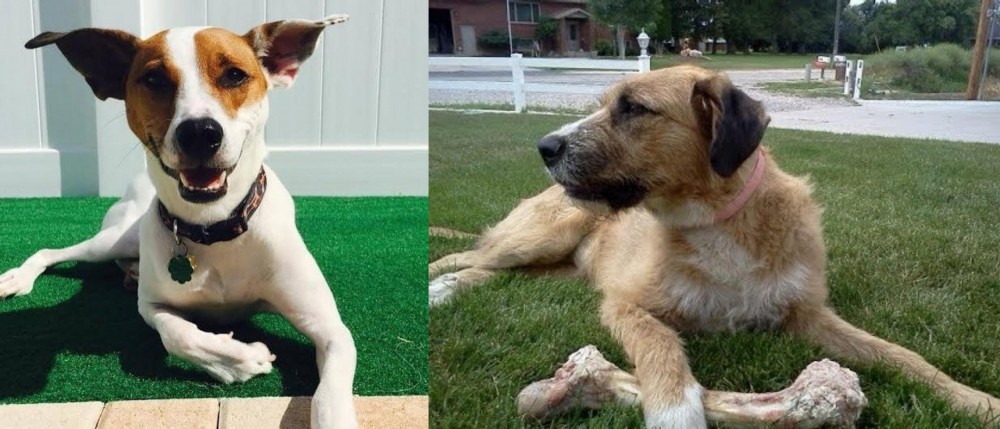 Both Feist and Irish Mastiff Hound are originated from United States. Feist may grow 35 cm / 13 inches shorter than Irish Mastiff Hound. Feist may weigh 59 kg / 130 pounds lesser than Irish Mastiff Hound. Feist may live 6 years more than Irish Mastiff Hound. Feist may have less litter size than Irish Mastiff Hound. Feist requires Low Maintenance. But Irish Mastiff Hound requires Moderate Maintenance
Both Feist and Irish Mastiff Hound are originated from United States. Feist may grow 35 cm / 13 inches shorter than Irish Mastiff Hound. Feist may weigh 59 kg / 130 pounds lesser than Irish Mastiff Hound. Feist may live 6 years more than Irish Mastiff Hound. Feist may have less litter size than Irish Mastiff Hound. Feist requires Low Maintenance. But Irish Mastiff Hound requires Moderate Maintenance
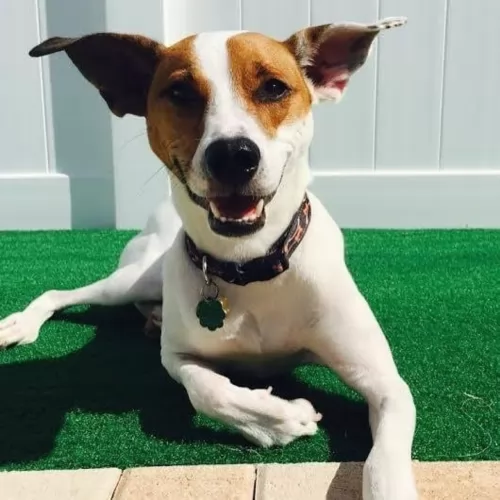 The Feist is a small dog from the United States, coming from Terrier dogs which were brought over to the States. It is believed that these Terriers included crosses between several terriers – the Manchester Terriers, Smooth Fox Terrier and English White Terrier – dogs used as ratters and known for their skills in killing rats.
The Feist is a small dog from the United States, coming from Terrier dogs which were brought over to the States. It is believed that these Terriers included crosses between several terriers – the Manchester Terriers, Smooth Fox Terrier and English White Terrier – dogs used as ratters and known for their skills in killing rats.
The Feist isn’t a new type of dog and in fact there are records of the dog which go back centuries. George Washington even referred to them in 1770 already, and the breed was popularized by President Teddy Roosevelt, who hunted with his Feist.
 The Irish Mastiff Hound is a huge dog – a mix of the English Mastiff and the Irish Wolfhound.
The Irish Mastiff Hound is a huge dog – a mix of the English Mastiff and the Irish Wolfhound.
Both of these dogs have been around for a long time and actually have ancient histories. The Mastiff for instance has origins that date back to ancient times in China, while the Irish Wolfhound has origins that date far back to 391 AD.
Today this dog is regarded as an excellent companion for any home.
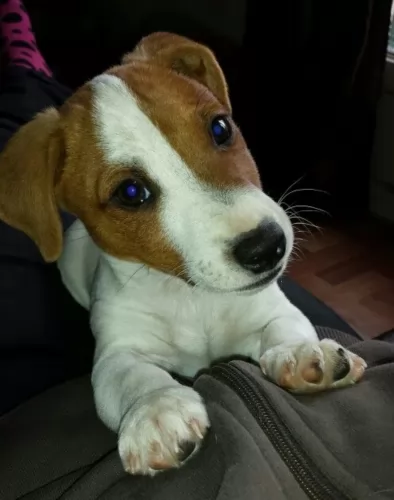 Standing at about 46cm to 56cm in height and weighing in the region of 10 to 15kg, the Feist is a short haired dog that doesn’t shed much and he is not hypoallergenic.
Standing at about 46cm to 56cm in height and weighing in the region of 10 to 15kg, the Feist is a short haired dog that doesn’t shed much and he is not hypoallergenic.
The coat of the dog is available in a variety of colors but they are essentially a bi-colored dog such as red and white, tan and white, black and white, while solid colors are fawn, white, light brown, black and brindle too.
Perhaps because of so many genes being involved with this dog, it is more easily identified because of its hunting abilities. He is a sturdy dog with a medium length tail which he holds up. Some Feist owners prefer the look of a docked tail and then docking is between the second and third joint of the tail. The Feist has erect or semi-erect ears.
Intelligent and alert, the Feist is a dog that will respond well to training. As with any other dog, training and socialization will be important for him so that he is obedient. He is energetic, curious and alert and above all he wants the attention of his human family.
 This is a large crossbreed which can stand at 85 to 91 cm in height and weigh in the region of 47kg to 74kg.
This is a large crossbreed which can stand at 85 to 91 cm in height and weigh in the region of 47kg to 74kg.
He essentially has the short, smooth coat of the Mastiff but other dogs may well inherit the longer, more wiry coat of the Wolfhound. Coloring of the coat can be quite varied and can be brown, grey, white, tan or black. Some dogs take more after the Mastiff while others have more Wolfhound characteristics. They have a large head, some have a somewhat wrinkly face because of the Mastiff side, the ears are fairly small and floppy and the tail is long.
Even though they're so huge, these are easy going dogs that are able to fit in well with most human families. Described as gentle giants, they are loving, loyal, easy-going, even-tempered and eager to please.
The Irish Mastiff does well in the city or in the country because he isn't particularly active and will be happy to have a comfortable spot to lie close to you, however with such a large dog, you will certainly need a garden.
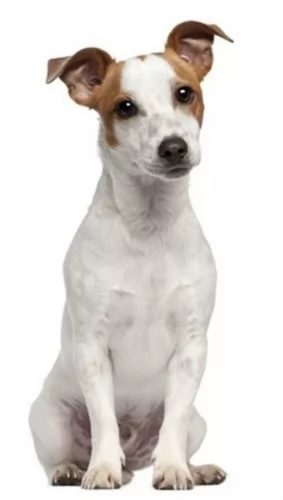 Loving to be around his human family and being a devoted and loyal canine friend, the Feist is also an intelligent, energetic dog who is fairly easy to train.
Loving to be around his human family and being a devoted and loyal canine friend, the Feist is also an intelligent, energetic dog who is fairly easy to train.
Bright and alert he makes a good watchdog too, but is amicable enough to get on well with other pets in the home as well as with children.
He can be stubborn so training and socialization will be important for him. As it is, he likes a firm, strong owner and in exchange for good care, he will become your devoted, loyal friend.
 Your big Irish Mastiff Hound is cool, confident and calm. He isn't particularly energetic and as long as he gets a nice walk as well as some mental stimulation, he'll be happy, wanting to spend a good part of the day lying close to where you are.
Your big Irish Mastiff Hound is cool, confident and calm. He isn't particularly energetic and as long as he gets a nice walk as well as some mental stimulation, he'll be happy, wanting to spend a good part of the day lying close to where you are.
Socialization and training will be good for him and he learns easily. He is just a big gentle giant who promises to make you a wonderful canine friend.
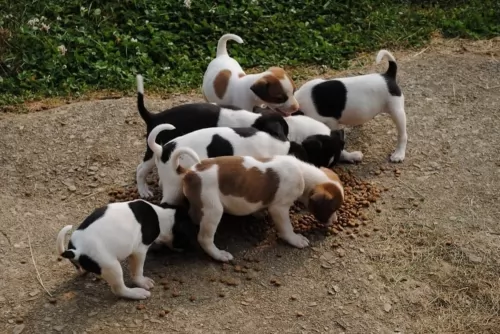 A Feist is a robust dog who doesn’t have any particular health issues, and with good care he can reach 18 years of age if looked after well. Hip Dysplasia is such a common dog illness that it always bears mentioning.
A Feist is a robust dog who doesn’t have any particular health issues, and with good care he can reach 18 years of age if looked after well. Hip Dysplasia is such a common dog illness that it always bears mentioning.
This is a ball and socket joint problem where the joint doesn’t function smoothly and the grinding of the bone leads to pain and arthritis for your pet. You'll notice he battles to play games anymore and he also battles to get up after lying down. You need to know that this disease isn’t reserved for old dogs but can start while your dog is still a puppy and that it can lead to lameness.
Look out for allergies in your dog as they can cause a host of problems which can include his skin, his breathing and problems with digestion. Typical symptoms of a dog with allergies include sneezing,scratching and very distressing for a dog, itchy and red skin which can eventually ooze.
As a responsible dog owner it is imperative when you detect problems with your dog, to get him to the vet immediately.
 Many people find giant dogs irresistible because they're usually gentle, patient and loving. However, it is their very size which makes them more prone to certain health concerns and gives them a shorter lifespan.
Many people find giant dogs irresistible because they're usually gentle, patient and loving. However, it is their very size which makes them more prone to certain health concerns and gives them a shorter lifespan.
It is why it is so important to ensure you feed your pet a healthy diet to ward off illness. A large dog like the Irish Mastiff doesn't have a particularly long lifespan, and with good care he can get to 9, 10, 11, 12 years of age.
This condition is more common in large dogs and it can lead to joint degeneration, arthritis and pain. Your pet may even be reluctant to get up and greet you when you come home which can be very sad. Vet intervention will certainly be required.
This heart disease is commonly seen in large dog breeds where the heart becomes weak so that it can't pump blood throughout the body. Coughing, difficulty with breathing, weakness and lethargy are just some of the symptoms of this disease and will also require veterinary intervention.
 Grooming your Feist dog isn’t going to be costly or difficult at all, as with his short, smooth coat he will essentially only require a brush twice a week.
Grooming your Feist dog isn’t going to be costly or difficult at all, as with his short, smooth coat he will essentially only require a brush twice a week.
It’s good to get into the habit of brushing him as not only does it keep his coat sleek and shiny, he loves you paying him attention.
All dog owners need to know that grooming goes beyond just brushing the coat. You want to also check his nails that they are short, check in and around his ears and brush his teeth with special dog toothpaste and toothbrush.
Give your Feist the very best dog food there is. Home-made is always good but if you feed him commercially manufactured food, make sure its a quality one. Some raw meat added in every now and again is important for his health. Ensure fresh, cool water is available to him around the clock.
Your Feist is an energetic dog that has been accustomed to hunting and running down small prey. He is an outdoor dog, thriving on fun and games. Take him on your walks, your hikes or when you go cycling or swimming. He wants to be right there with you involved in everything. While he can slot into life in the city or the countryside, he isn’t an indoor dog and it certainly won’t be good for him if you keep him cooped up in a tiny garden and pretty much forget about him.
 He has a short coat, and grooming of this laid-back dog will include brushing him twice a week, trimming his nails and making sure that you check inside his ears for ear infection.
He has a short coat, and grooming of this laid-back dog will include brushing him twice a week, trimming his nails and making sure that you check inside his ears for ear infection.
Large dogs have special nutritional needs, particularly because they are more prone to illnesses such as hip dysplasia. You want to make sure that the foods he eats are rich in Omega-3 fatty acids, glucosamine, chondroitin, amino acids and antioxidants because these will ensure proper joint health.
You've got to be careful what you feed a large breed dog because of the weight management issue too. Excess weight puts stress on the joints and promotes the development of osteoarthritis. Speak to your vet about portion control and meat protein for your pet and how to ensure excellent nutrition to avoid common dog illnesses.
Fresh, cool water needs to be available to your pet every minute of the night and day.